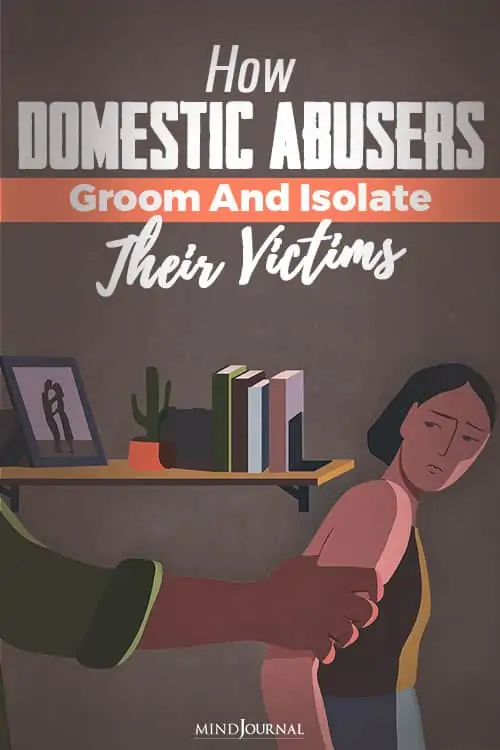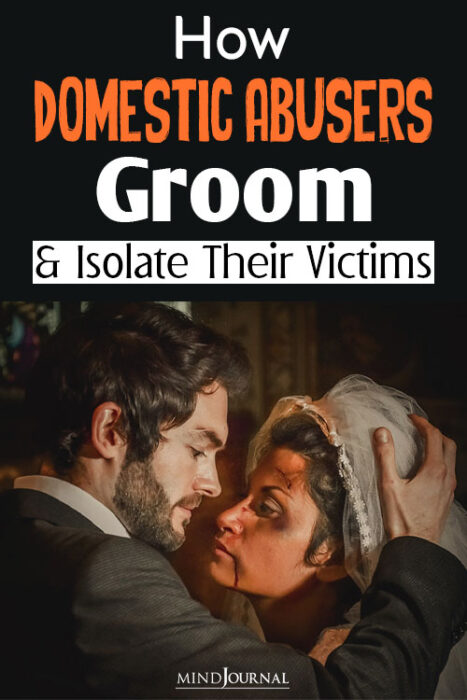The biggest manipulative tactic and weapon of domestic abusers is the way they groom and isolate their victims, to the point that the victim themselves and everyone around them end up believing the abuser only. Find out how domestic abusers groom and manipulate their victims.
Domestic abusers often entrap their future victims with intense romance. Violent and controlling relationships may begin with overwhelming attention, sweet words, and gifts that make future victims close their eyes to the red flags indicating potential abuse.
Abusers Often Come On Strong
Intense romance can be a form of grooming, a predatory tactic that is meant to build a deep emotional connection. Abusers know exactly what they are doing.
Sara was just 22 when she met 30-year-old Sam. Within two weeks, he had moved into her apartment, put his name on her bank account, and claimed her every second when she was not at work. Sam asked about her most intimate experiences, secrets, and dreams, and accompanied Sara whenever she went out.
At first, Sara was elated — no man had ever loved her this intensely. He put away their phones when they were together so they could concentrate on each other. He pushed her to skip events at work and with friends, saying their relationship was the priority. He made exciting alternative plans for the holidays, so she missed family gatherings.
Sam asked Sara for access to all her social media accounts as a “sign of trust.” When Sara objected, Sam accused her of lacking commitment and became sullen. He classified all her attempts at privacy or independence as signs that she did not love him.
Sara gave in, it was easier than fighting, and she desperately wanted to preserve the “purity” of their love. Sam had groomed Sara into isolation, and isolation made her vulnerable to further coercive control.
Related: 5 Subtle Signs of Domestic Violence
Intimidation Is Next
Romantic gestures can abruptly turn into intimidation. Abusers typically blame their partners for growing tensions. Victims will work hard to appease the abuser, trying to keep themselves safe and get back to the early glow.
After a romantic dinner one evening, Steve began kissing and taking off the clothes of his boyfriend, Derek. Derek kissed him back but said he did not want to have sex. Steve grabbed him hard by both arms and stared into his face, threateningly.
For the first time, Derek felt afraid of Steve, who was bigger and stronger than he was. At that moment, Derek understood that saying “no” to sex was not really an option.
To keep the peace, Derek never again directly refused to do what Steve asked of him sexually. Derek felt intimidated throughout the remainder of their relationship but tried to avoid thinking about it.
From initially making their partners feel loved unconditionally and like they can do no wrong, abusers then make their partners work hard to please them, blaming and acting hostile when they do not get their way.
How Domestic Abusers Groom Their Victims: Grooming The Community
Abusers often groom friends, family, and others to overlook signs of abuse and cut ties with the victim. They strategically act charming and helpful, so people cannot imagine the cruel acts occurring behind closed doors.
Iris described how Dave would mow their neighbors’ lawns, play the organ at church, and coach children’s sports teams. No one believed Iris when she first tried to describe how he treated her and the children when they were home alone.
Sometimes abusers groom the community by ruining their partner’s reputation. This can be overt or subtle.
Leticia said she lost her friends soon after getting together with her husband, “because of the stories he made up or twisted to make me sound incompetent, lazy, and crazy.”
Mike called Lisa’s friends and asked them to let him know if she did anything peculiar, subtly indicating that he was worried that she was becoming “unhinged.” She noticed certain friends looking at her strangely, but did not know why. The unexplained change in her friends’ behavior estranged her from them.
Jacob told members of their tight-knit religious community that Hannah was behaving immodestly and neglecting their children. When she tried to leave him, their community shunned her and fought on behalf of her husband’s bid for child custody.
Related: How To Recover From Emotional Trauma of Domestic Violence
The Effects Of Grooming
Awareness of the grooming process helps us understand the plight of someone in a relationship with an abuser. Grooming helps explain why people may stay with abusers, submit to their demands, and push away others who try to help.
Cassandra Wiener, a coercive control researcher, entreats readers to understand how this grooming process can break down survivors.
She explains that survivors of domestic violence and coercive control “are vulnerable, but not because they are weak, character-deficient, or mentally unwell. They are vulnerable because they have been groomed (Wiener, 2017).”
If you are concerned that you or someone you care about has been groomed for an abusive relationship, the following can help:
- Learn about coercive control.
- Complete an inventory of the abusive partner’s control.
- Avoid isolation by staying connected to friends and/or relatives. Remember that abusers tend to monitor their partners’ contacts, so keep these conversations light and generally supportive, unless you are certain you have privacy.
- Speak with a domestic violence advocate at any stage in the relationship, even if there is no physical violence. Advocates help people understand their situations and figure out safe pathways forward.
Want to know more about how domestic abusers groom their victims? Check this video out below!
Written By Lisa Aronson Fontes Originally Appeared In Psychology Today











Leave a Reply
You must be logged in to post a comment.